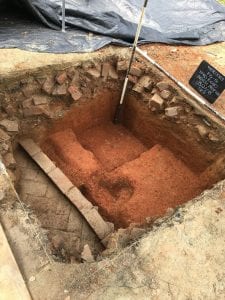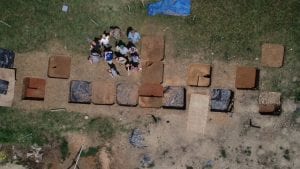By Samantha Taylor
Let’s face it…grad school feels like an eternity. My two years at IUP felt almost as long if not longer than my four years in undergrad. It’s only been six months since I received my M.A. from IUP and time is flying by. So much has happened and I’m proud to say that IUP has adequately prepared me for life as a professional archaeologist.
This past summer I accepted a job as the assistant site director for Virginia Commonwealth University’s field school at the Fort Germanna/Enchanted Castle Site in Orange County, Virginia. The position was 15 weeks long and my first foray into supervising. I was nervous to teach students how to dig and to serve as a role model for future archaeologists. My job description included assisting the site director (the amazing Dr. Eric Larsen), supervising our four interns, and teaching field school students. Our goal was to locate the Fort Germanna, an early 18th century fort built by Lt. Governor Alexander Spotswood for German colonists. The fort supposedly intersected the west hyphen of the Enchanted Castle, Spotswood’s house which postdated the abandonment of the fort. This summer we excavated the area to the north of the structure which hugged the façade of the house. While we did not find the fort, we were able to better understand the function of the front lawn of the Enchanted Castle. Meanwhile, students and interns were able to gain valuable experience. I was incredibly fortunate that my boss, interns, and students were all wonderful and talented. During my time at Germanna, I took a particular interest in helping design the four public access days that Germanna hosted this past summer. In fact, I will be chairing a session the first ever paper session on Germanna Archaeology and presenting on Germanna public archaeology at MAAC next spring (be there or be square). I doubt I’ve enjoyed a job as much as I’ve enjoyed my time at Germanna. Not only was my position fulfilling, but I made lifelong friends with my crew and was able to inspire some of them to continue pursuing archaeology as a career.
My job at Germanna came to an end on August 30th, but fortunately my next job was already lined up. I started my current position at New South Associates, Inc. on September 4th. I am an archaeologist/field director at the Greensboro office in North Carolina. My job description includes directing field work and writing reports for various projects across the southeast. I spend about 50% of my job working in the field with a variety of archaeologists who come from all over. The other 50% of my time is spent synthesizing data and writing reports.
While it’s only been six months since I graduated from IUP, I feel as though my post-grad school career has been successful and fulfilling thus far. It’s definitely not always easy, and takes just as much dedication and time-management as school did. I know I have a long road ahead of me still, but wherever archaeology takes me I’ll be happy to go. So, to all the current graduate students and prospective graduate students here’s my advice: grad school is an emotional and physical commitment. It isn’t easy but it is worth it. Your two years in classes will feel like an eternity. Your time spent working on your thesis will feel never-ending. But the good news is that the grass is greener on the other side, and that these challenges will ultimately prepare you for what is ahead. Don’t give up, keep going! Your M.A. is on the horizon!



